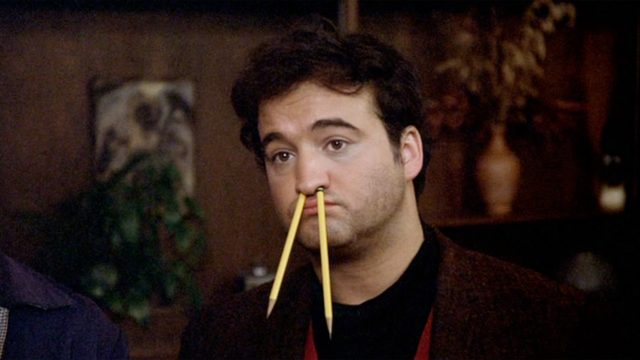Comedy ages differently than drama, especially comedy with pointed satirical intent. Drama with racist or sexist, etc. elements is certainly decried, but there’s a certain amount of aesthetic appreciation given for good craftsmanship or inventiveness. But there’s something more personal about a racist/sexist/etc joke. It cuts a little deeper, especially when it’s designed to be edgy in the first place. We are currently witnessing a shift away from the kind of edgy humor the National Lampoon (a spin-off of college periodical The Harvard Lampoon) popularized and codified as the dominant form of American humor, but it’s very deeply entrenched. A quick look at the publication’s alum shows a surprising number of very influential people in a variety of media. John Hughes came out of the National Lampoon magazine, and scripted a handful of their films; several writers and associated performers (Michael O’Donoghue, Anne Beats, John Belushi, Chevy Chase, etc.) became foundational members of Saturday Night Live; and staff writers Al Jean and Mike Reiss became showrunners of The Simpsons during its third and fourth season, when the show arguably became the cultural juggernaut we all know today. (Season 3 was also when Conan O’Brien was a writer, a man who was both an SNL and Harvard Lampoon alum) There aren’t many comic institutions where the company’s influence can’t be felt, for good or for ill.
Animal House is ostensibly a satire of nostalgia pieces, taking off the rose-colored glasses to reveal its protagonists as naive braggadocios with no sense of consequence or their own privilege. But the film is so in love with its own anti-authoritarianism and sense of comic anarchy that the point gets lost, and it can feel like it’s glorifying bad behavior. This is especially evident in the jokes aimed at the film’s antagonists, which are especially vicious and cruel, especially in highlighting homoerotic subtext in the predilections of arrogant men as points of shame. This, perhaps, is the most toxic influence the Lampoon has had: comedy as angry attack without consideration for whomever may get hurt as a result. The film’s weirdest misstep features a foursome from the fraternity taking some dates to a black club where a band who had played at their frat is playing. They immediately realize that they’re not supposed to be there, but stay because they’re naive white kids. This would be fine, if still very cringe, except the film then cracks a handful of bizarre racist jokes, and it undermines the point. And then there’s the strange case of Kate (played by Karen Allen), who basically falls into the trap of a woman being above the foolish antics of the men around her, but then fails to give her anything to do… except for a brief moment when she treats on her boyfriend with a professor who supplies them with weed… although the movie doesn’t really judge her for it? It’s not feminist and it’s not misogynistic. (I mean, there are plenty of other areas where the film is incredibly misogynistic, just not in regards to her character) You get the idea she’s supposed to be a grounding element in the movie, but it just feels out of place amongst the rest of the aggressive absurdity.
And yet the movie isn’t a total loss. In fact, there are quite a few really great bits and pieces that still play very well (in my opinion) today, like shooting golf balls at an ROTC practice, or Belushi destroying a serenader’s guitar, or the chaotic attack on the parade, or the entire ill-fated prank sequence where a fraternity pledge sneaks a horse into the Dean’s office and accidentally gives the animal a heart attack, and the subsequent day where, during a meeting, a puzzled custodian has to figure out how to remove the carcass. (His solution is to cut it in half with a chainsaw.)
It’s not that I think these pieces outweigh the awful things in the film, or that I don’t care about the awful pieces, especially since they always grind the movie to a halt. But I enjoy more of it than I find repellant, and as with a drama I confront those problems. The only way I handle this (or any other comedy) differently than a problematic drama is that I generally don’t recommend it to people, because as I said at the top of the article misguided comedy hurts much more than a misguided drama, and Animal House is often *incredibly* misguided.

